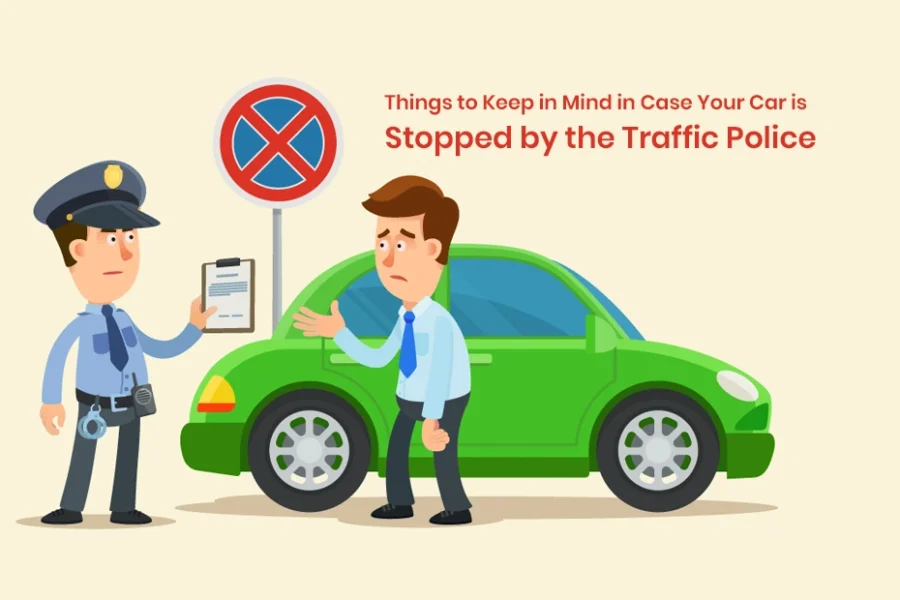India has a large population, and the amount of traffic there makes it challenging for traffic officials to uphold law and order. The Motor Vehicles Act of 1988 lists a number of fundamental traffic laws that each and every person should abide by. If you break these rules, traffic police will stop your car and take it off the road. The traffic police may also stop cars as a result of routine inspections.
What to do in Case a Traffic Police Officer Stops You?
The following are some of the significant points that you should keep in mind in case a traffic police stops you:
*Stopping the vehicle does not always mean breakage of the law. Listen to the traffic police as they might provide vital information regarding your vehicle, such as punctured tyre, driving without headlight, etc.
*Cooperate with the traffic police and stop the vehicle once stopped by the police as not doing so, may lead to legal complications
*Pull over your car safely after checking for any speeding vehicle and do not rush to change lanes to avoid accident
*Remain calm when stopped by the traffic police, roll down the window, and stop the engine
*Never argue with the traffic police and accept if any law has been breached
*Do not bribe the traffic police, instead pay the penalty if law has been broken
*Car can be detained if law has been violated, such as driving without driving license, car insurance policy, or parking in ‘No Parking’ zone
*Driver can be detained for breaking motor laws and driver should be presented in front of the magistrate less than 24 hours
Documents to Carry While Driving a Car:
The following are the documents that should be provided in case your car has been pulled over by the traffic police:
1. Driving license of the driver
2. Pollution Under Control Certificate (PUC) of the vehicle
3. Registration Certificate (RC) of the car
4. Valid car insurance document that has at least one third-party insurance coverage
What are the Basic Rules to Follow While Driving a Car?
1. Avoid drunk driving: Drunk-driving Road accidents have increased considerably over the years, due to which government of India has set the permissible limit of blood alcohol up to 0.03%. An individual can be charged a penalty amount ranging between Rs.2000 to Rs.10,000 or sentenced to seven months to fours imprisonment if someone fails to pass the BAC (Blood Alcohol Concentration) test.
2. Do not drive a two-wheeler without wearing a helmet: All the individuals on a two-wheeler must wear helmets as the Motor Vehicle rules, otherwise drivers will be charged with penalty of Rs.1000. The license of the vehicle owners or drivers may also be suspended for three months by the traffic authorities in serious cases.
3. Keep the valid car insurance policy while driving: Valid third-party car insurance coverage should be possessed by the motor vehicle owners as per the Motor Vehicles Act 1988. Individuals may be penalised for not carrying motor insurance or carrying lapsed insurance. The penalty amount be Rs.2000 and Rs.4000 for first-time and repeated offence, respectively.
4. Never forget to wear the seat belt while driving a car: Must wear seat belt while driving and not doing will be considered as a violation of motor vehicles rules, thereby leading penalisation of Rs.1000.
5. Avoid over speeding: Drivers should not exceed the speeding limit set by the government. Failing to do so will result in penalties of up to Rs.1000 to Rs.2000.
6. Follow the ‘No Entry’ zone indication: Avoid entering ‘No Entry’ zone that are marked with specific signals to avoid accidents, as these are created for one-way traffic movement.
Rights of a Commuter in India:
*The traffic policeman cannot seize your driving license unless you have broken the rules. Jumping the red light at a traffic signal, driving under the influence of alcohol, overloading the vehicle, and using a mobile phone while driving is some of the common traffic offences seen in India.
*policeman will be in uniform with his/her name and buckle number clearly displayed. Ensure you are showing your papers to a uniformed officer only.
*The police will not tow your car unless you vacate it.
*In case you are a female and have been stopped by the police after 6 p.m., you can request for a female cop to physically search you.
*The traffic police will not force you out of the vehicle or take away your car keys.
*The traffic police should have an e-challan machine or a challan book to fine you. The cop is not allowed to impose a fine without this.
*In case you have violated the law and have been arrested, you will be taken to the police station. If you are detained, you can be brought to court within 24 hours.
*The traffic police has absolute authority on the road. You should follow his/her instructions promptly.


Always ahead of the curve with global healthcare trends.
lisinopril bula
Leading the way in global pharmaceutical services.